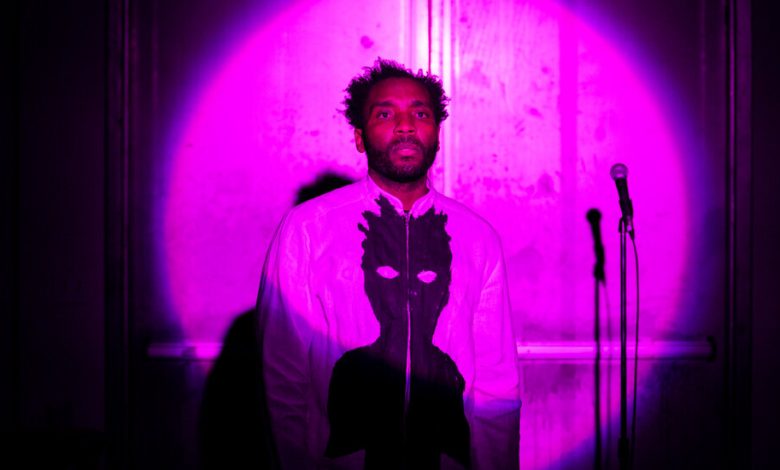Review: In ‘Self Portraits (Deluxe),’ a Provocateur Instigates Reflection

The playwright and performer Phillip Howze begins “Self Portraits (Deluxe),” now running at Jack in Brooklyn, by quietly asking for introductions. As he holds up a microphone to spectators (masks are required), Howze’s genial facial expressions mirror each person’s tone of voice. It’s a deceptively empathetic prologue to a fractious and abstracted 80-minute show.
In sputtering, stream-of-consciousness-style prose, the artist delves into bouts of self-reflection and social recrimination. Howze muses that he’s never heard of a Black man dying on the toilet, confesses that he has a very small penis, and wonders whether there’s a condom for life experience. (A flushing sound punctuates each discursive riff.)
“Make yourself comfortable,” he tells the audience, seated at various angles in the center of a low-ceilinged room the size of a convenience store. “The only way out is through.”
The statement portends a sense of captivity that escalates, in ways that are both pointedly intentional and likely inadvertent, throughout this Bushwick Starr production, presented in association with Jack and directed by Dominique Rider. Strobe-like effects (by Masha Tsimring) and soundscapes that evoke an abandoned city on the moon (by Kathryn Ruvuna) lend tension, and an occasional air of drama, to the ensuing collage of performance art interludes. Howze’s preoccupations with shame and death create a tenuous through line.
In the next scene, Howze is splayed out on a mattress beneath a suspended fun house mirror, skis dangling from the ceiling as he rehearses his final thoughts. It’s a nod to the death of the actress Natasha Richardson, who suffered fatal head injuries in a skiing accident in 2009. There are less distasteful ways of implicating an audience (mostly white, on the night I attended) in the injustice that attends the degradation of Black men than by suggesting that dying on the slopes is a relatively luxurious, and distinctly white, way to go.
As a provocateur, Howze is neither subtle nor as sensitive as his outward demeanor suggests. In a sequence that would mortify anyone averse to audience participation, he gently beseeches a handful of patrons to stand with their hands up and foreheads against the wall, like a row of perpetrators. (“Would you mind? For me?”) Rather than a daring coup, it feels like a breach of good faith — for anyone to refuse would result in a different kind of humiliation.
We are having trouble retrieving the article content.
Please enable JavaScript in your browser settings.
Thank you for your patience while we verify access. If you are in Reader mode please exit and log into your Times account, or subscribe for all of The Times.
Thank you for your patience while we verify access.
Already a subscriber? Log in.
Want all of The Times? Subscribe.
